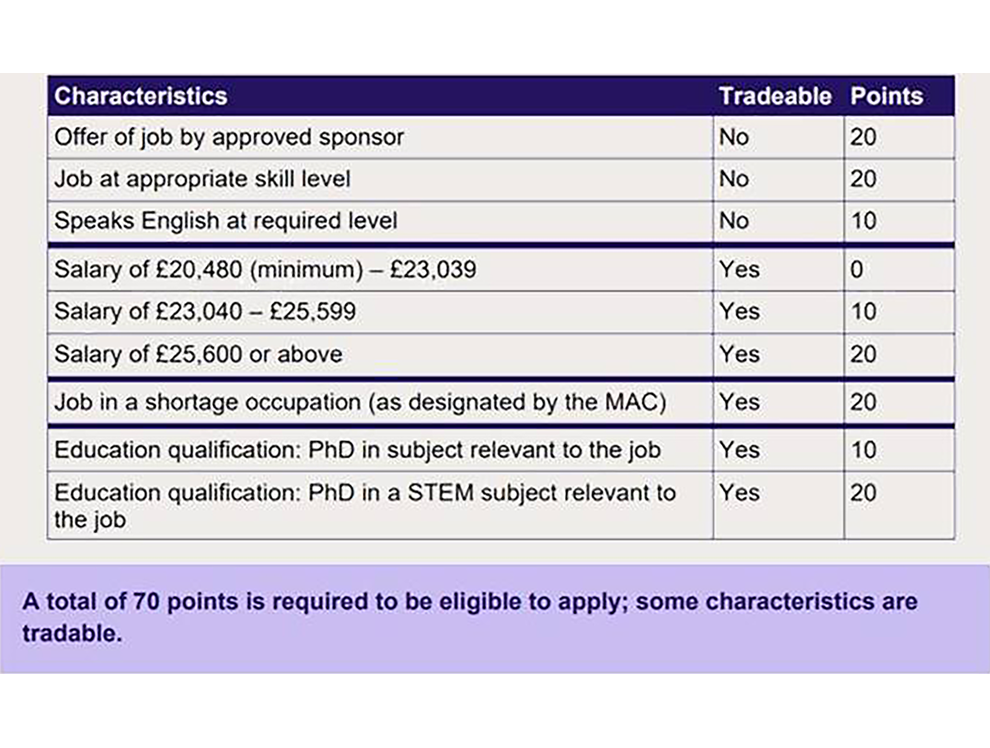Last month, the UK government published the first part of its long-awaited proposals for reform of the UK immigration system. European businesses, including private fund managers and their portfolio companies, have until 1 January 2021 to prepare for the new “points-based” system, which will no longer treat EU citizens differently from other foreign nationals. The challenges will be particularly acute for employers who currently rely on employees with lower skills or income migrating from the EU. Those people will find it much more difficult to come to the UK to work from next year, and the government says that businesses must “adapt and adjust” to that. On the other hand, prospective employees with a job offer and the right level of skills will generally be given a visa.
The “points-based” approach will only be available for jobs paying a basic salary of at least £20,480. Applicants will then need to obtain 50 points in three compulsory categories (as shown on the table below): they must hold an offer from an employer with a sponsor licence; they must be able to speak English to the required level; and they must have an appropriate level of skill. However, the applicant will then need to find another 20 points to reach the threshold of 70. A basic salary of £25,600 or above will achieve that; otherwise, there are other ways for those with an offer at a salary of between £20,480 and £25,600 to get the extra points, including where the job is in an occupation with a designated “shortage”.

This system will apply to EU citizens arriving in the UK from the start of next year, not those already here – who can register under the EU Settlement Scheme until 30 June 2021. It is similar to the “Tier 2” system that already applies to non-EU citizens, although with some important changes: the “appropriate skill” level will reduce from the equivalent of a degree to the equivalent of “A” levels (RQF Level 3); the requirement to advertise the post in the UK (the so-called “resident labour market test”, designed to establish that no suitable UK-based applicant is available) will be abolished; and the cap on numbers will be suspended. This new system will replace the existing one and will therefore apply equally to EU and non-EU applicants.
In addition, as is the case at the moment, the rules also foresee certain salary adjustments to ensure that the applicant is being paid at least the “going rate” for the job and for new entrants, including (for example) those who have been studying for a degree in the UK and wish to remain.
Although, from 1 January 2021, EU citizens will be able to visit the UK for up to six months at a time without needing a visa, the normal rules on business travel will also apply to them. As with non-EU visitors at the moment, they will not be allowed to work, although they will be able to carry out certain business activities, such as attending meetings, gathering information and negotiating deals. Unless the rules are changed, visitors will not be able to provide services or undertake secondments in the UK without a work visa, except in very limited circumstances. The government has said that it will simplify the rules for visitors, so it remains possible that a wider range of business activities will be permitted in future.
UK-based employers will want to start work now to assess how these changes will affect them. At the very least, costs will increase as visas will be needed for incoming EU citizens for the first time, and sufficient time will be needed in recruitment processes to enable an appropriate visa to be obtained.
These changes represent Phase 1 of the new regime. The next phase, including a possible route for highly skilled workers who do not have a job offer (which will be separate from the current Global Talent category), is not expected to be announced until next year.
This edition of European Funds Comment is an edited version of a note previously published by the immigration team at Kingsley Napley, and we are grateful to Nicolas Rollason and Kim Vowden for their help with it.